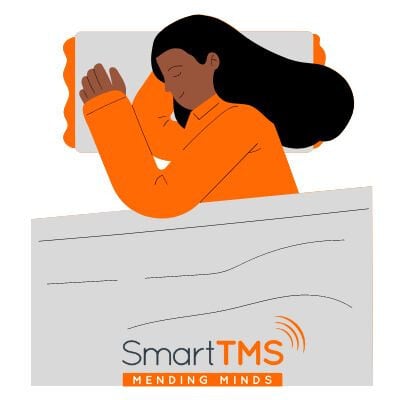Sleep quality and mood improve independently after rTMS, in patients with depression
June 20, 2022 - Smart TMS

Smart TMS went to the Clinical TMS Society Conference
Our CEO, Gerard, and Lead Practitioner, Athana, recently attended the 10th Annual Meeting for the Clinical TMS Society in Chicago, in May 2022. During this meeting, they presented some Smart TMS original research and patient case studies. It also provided a great opportunity to learn from and explore other areas of interest and research surrounding TMS treatment, that are currently being utilised in the United States.
In particular, one area of research that stood out throughout the conference, was sleep quality and mood improvement. Research suggested that both could improve independently, following repetitive Transcranial Magnetic Stimulation, also known as rTMS, in patients with Major Depressive Disorder.
The Mayo Clinic Sleep Study
Sleep quality and mood improve independently after repetitive transcranial magnetic stimulation in patients with major depressive disorder.
One study that was particularly interesting was conducted by the Mayo Clinic (Colins, A, et al., 2022). The study is retrospective and seeks to understand if sleep quality improves, following repetitive transcranial magnetic stimulation.
A total of 21 patients took part in a six-week course of rTMS. The TMS pulses were administered over the left dorsolateral prefrontal cortex (LDPC). A total of 3,000 pulses were given on each day to each patient.
Results
In order to measure the success of the treatment, patients completed psychometric tests which comprised of the Patient Health Questionnaire (PHQ-9) and the Pittsburgh Sleep Quality Index (PSQI). Within the PSQI, Q3 was omitted. The psychometric tests were completed both prior to starting treatment and following the completion of treatment, therefore at the end of the 6 week period.
The results indicated that, of the 21 patients, the mean score calculated from the PSQI was 12 at pre-treatment, and 10.5 at post-treatment. The mean score from the PHQ-9 was 17.3 pre-treatment compared to 12.2 post-treatment.
It was also found that the components with the most improvement in the PSQI was item 1, fairly bad and item 2, very bad. The rTMS treatment also showed most improvement in the following items from the PHQ-9 including item 2, feeling down, depressed or hopeless; item 3, trouble falling, staying or sleeping too much; item 5, appetite or overeating; item 6 feeling bad about self or failure or let down to self or family; item 7 trouble concentrating on things; and item 9, thought you would be better off dead or hurting yourself.
Conclusion
In conclusion, mood and sleep quality both improved independently following the rTMS treatment, even after making the adjustments for age, sex, sedative usage, number of treatments taken and the severity of depression. This suggested that rTMS directly affected both mood and sleep in patients with Major Depressive Disorder, within this study.
It must be noted that, although this study supports the success of rTMS treatment for mood and sleep, there were some limitations to consider within this study. Namely there was a small sample size, lack of a control group and no comorbidities were taken into consideration.
Therefore, there is scope for further research into rTMS for insomnia. It produces questions such due to the small sample size, not including the co-morbidities or a placebo effect.
Positively, it could assume that rTMS could lead to a reduction in the use of over-the-counter sleep medication and contribute to the alleviation of depressive episodes in MDD patients.
It may be good to consider that further research is required in the future to assess different aspects. Such as areas of mechanisms of rTMS in primary sleep disorders versus depression related sleep impairment, as well as whether the parameters show any difference in patients with depression based on the degree of sleep impairment.
At Smart TMS we treat patients with depression with a remission rate of 60% and offer TMS for primary chronic insomnia.
Nikki Green, Birmingham Practitioner.
Reference
Collins, A. B.A. (Alix School of Medicine, Rochester, MN)., Cheung, J. M.D. (Devision of Pulmonary and Sleep Medicine, Jacksonville, FL.)., Croakin, P. D.O. (Department of Psychiatry and Psychology, and Centre for Sleep Medicine, Rochester, MN.)., Kolla, B.P. M.D., Kung, S. M.D. (Department of Psychiatry and Psychology, Rochester, MN.). (2022). Sleep Quality and Mood improve independently after repetitive transcranial magnetic stimulation in patients with major depressive disorder. Mayo Clinic.










